How to Protect and Control Your Brand Reputation in AI Search
AI search is reshaping brand discovery. Here’s how to actively manage your presence in AI responses before they define you.
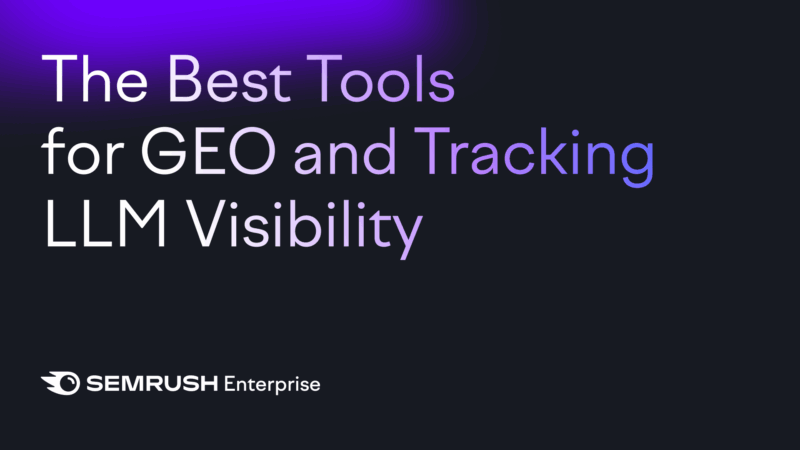
How consumers discover and engage with brands is fundamentally changing. With millions now turning to AI search platforms for instant answers and recommendations, your brand’s visibility and reputation are increasingly shaped by how it is mentioned and portrayed in AI-generated responses.
This paradigm shift means brands can no longer solely rely on traditional SEO techniques; they must proactively manage their presence in this new zero-click environment to avoid being defined by AI search without their direct input or control.
The way AI search platforms and LLMs perceive and portray your brand is far from a peripheral concern but a central pillar of brand and reputation management.
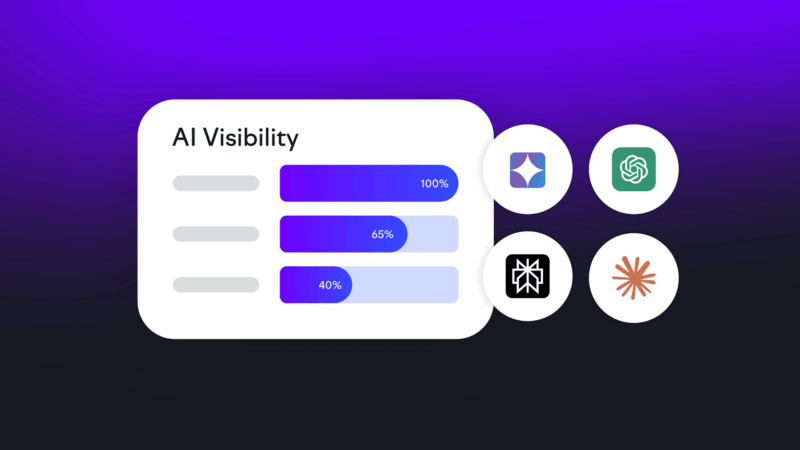
How AI is already shaping your brand narrative
LLMs build their understanding of your brand based on its online portrayal. This means that outdated, inaccurate, or negative content can significantly impact brand perception, lower trust, and ultimately cost potential customers.
Users often encounter inaccurate or misleading content in AI responses. Recent research from Exploding Topics found that 42.1% of respondents reported such issues with Google AI Overviews, and 16.78% even encountered unsafe or harmful advice.
This same research unearthed another trend: more than 40% of users rarely or never click through to the source material from AI Overviews. This means that if your brand is initially mischaracterized in an AI response, you’re unlikely to get a chance to correct the information with a click or further research.
The takeaway?
Brands must actively manage their online narrative to ensure consistent and positive messaging across all channels where AI learns and surfaces information to avoid being defined without their input or control.
Why your brand reputation is at stake
Without a proactive strategy, your brand risks being misrepresented or overlooked entirely in AI-driven search, leading to several critical issues:
Inaccurate or negative portrayal
AI models synthesize information from vast datasets, and if the data they are trained on contains outdated, inaccurate, or negative content about your brand, these issues can be reflected in AI-generated responses. Users have reported experiencing “inaccurate or misleading content,” “missing important context,” “biased or one-sided answers,” and even “unsafe or harmful advice” from AI Overviews.
Loss of narrative control
When AI models “rework” data to create conversational answers, your brand’s narrative might be portrayed incorrectly, potentially harming your reputation. This means your brand could be defined by what the AI says, rather than your intended messaging.
Invisible influence and lost visibility
If your brand isn’t mentioned or accurately represented in AI search, customers are likely seeing – and choosing – your competitors instead. This zero-click nature of AI responses makes traditional SEO metrics inadequate for tracking true brand influence, as users might discover your brand via AI and then navigate directly to your site later, making attribution challenging.
Erosion of trust
While AI Overviews offer convenience, user trust in them is often low, with 82% of people reporting some skepticism. If your brand is associated with an AI response that is perceived as unreliable, it could negatively impact user trust in your brand.
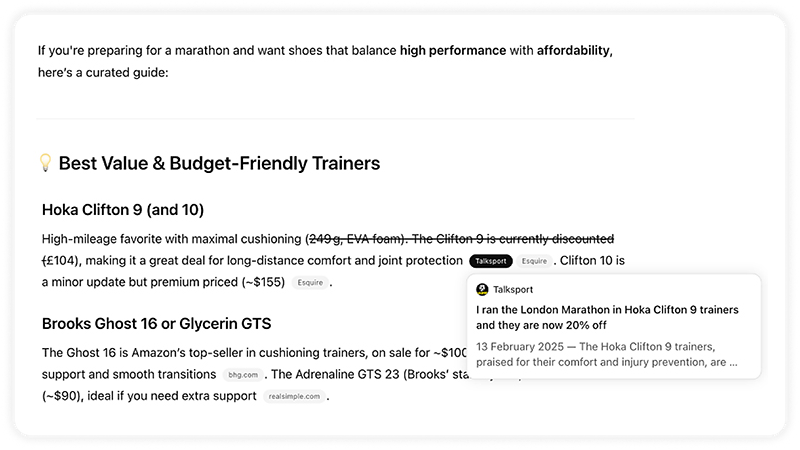
In this example, pricing information was taken from a dated third-party source rather than the Hoka site. While ChatGPT crossed out the incorrect price, it still demonstrates the trust risk involved.
Reinforcing brand signals through community, authority, and positive mentions
Standardize your messaging, descriptions, and positioning wherever your brand is mentioned online to reinforce your narrative clearly across all AI-driven platforms.
Target commonly cited websites
Actively work to get your brand mentioned on sites LLMs frequently cite, such as Reddit, Quora, and reputable news publications. Engaging in these communities and providing valuable input can significantly boost AI visibility.
Leverage digital PR and influencer channels
Identify publications that AI frequently references for your industry or topics, then pursue positive coverage across these. Building relationships with media, influencers, and industry voices can lead to valuable contextual brand mentions.
Encourage authentic reviews and UGC
LLMs heavily weigh authentic discussions, so encourage your happy customers to leave detailed, honest reviews to help build positive sentiment. All the better if there are measurable outcomes.
Ensure all product information is up to date across these sites, and actively monitor and engage with discussions about your brand on these platforms. If you’re using data, provide details about testing methodology and use short, declarative, and balanced statements.
Utilize structured “best of” lists
These help solidify brand or product associations. Organize lists with clear structure, explaining the selection process and providing “best” ratings that align with common search behaviors (e.g., “Best for freelancers on a budget”).
Using semantic chunking (short, clearly labeled sections) and repeatable structures helps AI parse and extract information efficiently.
Experiment with wider content publishing
Build standalone sites that cover your entire industry, not just your product. Highlight credible expertise, proven experience, and authoritative insights to help earn trust from LLMs and AI search engines. Consider repurposing research or content in video formats for YouTube and utilizing publishing sites like Medium to extend your reach and help reinforce your message.
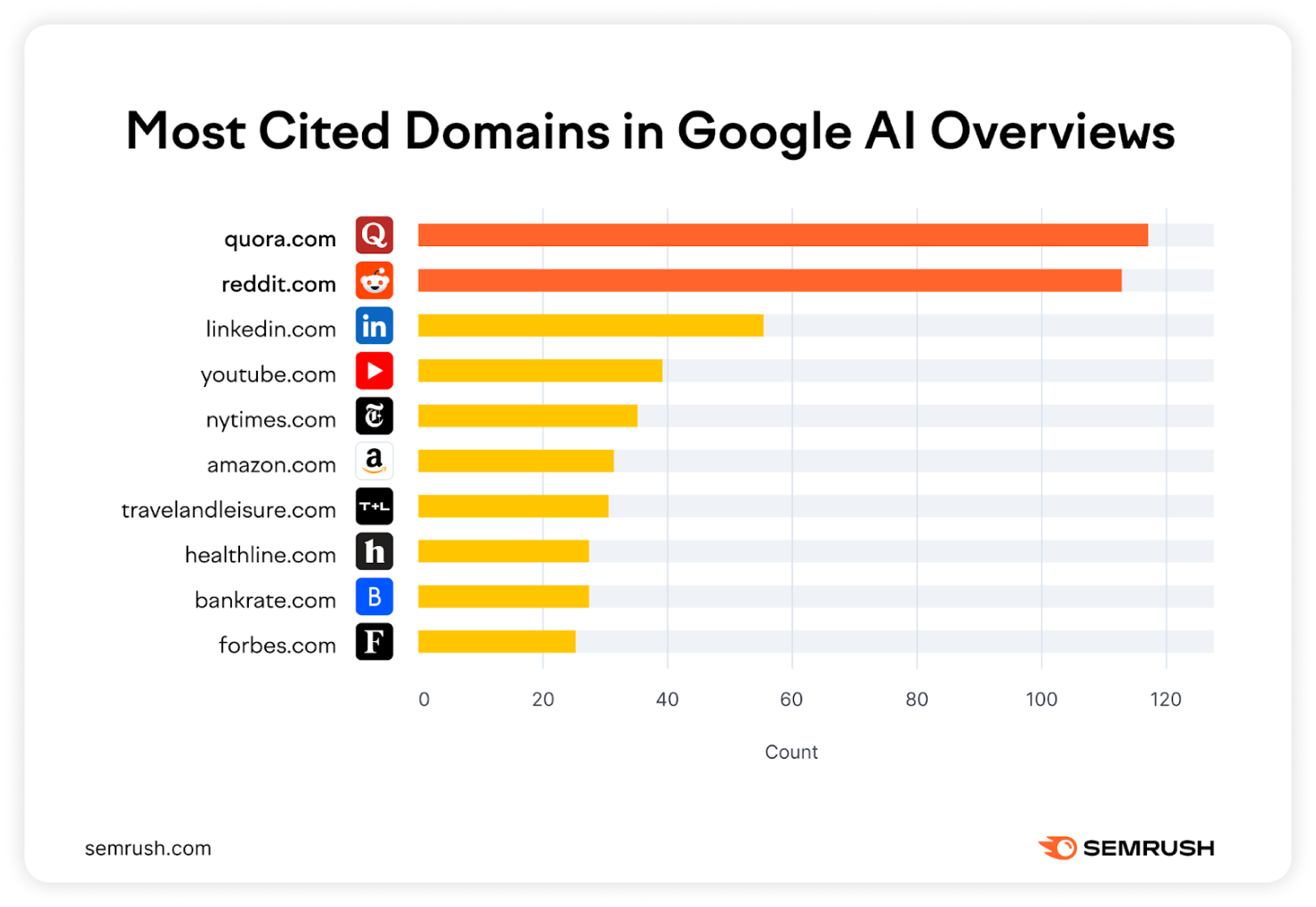
How to refine content for AI visibility
If AI crawlers can’t parse content, they’ll simply move on to another source or competitor. With this in mind, it’s vital to use techniques and structures that allow this across your own channels or other secured placements.
Structure for clarity and AI readability
AI models favor content that provides clear, direct answers, often in structured formats. Use FAQs, bullet points, step-by-step guides, and tables. Ensure content is organized into clear, concise sections with natural language headings.
Prioritize specificity and data
Replace vague statements with concrete, sourced statistics, expert quotes, and case study results that AI systems can easily extract and cite as evidence. Adding your credentials and experience to author bios can also signal authority to AI systems.
Tailor content for intent and audiences
Create content that answers specific, often long-tail, user questions, providing complete answers upfront. LLMs can provide highly personalized responses, so content that aligns with specific user profiles and intents is more likely to be mentioned.
Focus on usefulness
Google’s existing E-E-A-T principles largely apply here. Create original, useful content, especially for niche topics or complex prompts that competitors may not be addressing. Publishing research-driven insights and thought leadership content helps earn citations and reinforces authority.
It is also a great practice to create tools, templates, and frameworks with clear, descriptive titles and supporting content that explains their use and value.
Ensure robust online reputation management
Sentiment and source management
Track your brand’s sentiment in key prompts and the sources fuelling these. This will help you map out the topics and placements that you should target to amplify strengths and address weaknesses.
Crisis management
Review your brand’s offering holistically and define talk tracks for any key features or positioning that must be aligned. Develop a crisis management strategy to address and mitigate the impact of inaccurate or unflattering content quickly.
Monitor and respond
Perhaps the most vital. Don’t leave negative feedback to snowball and have an association formed. Continuously monitor online discussions about your brand. Respond quickly and strategically to reviews and feedback, whether positive or negative. Ensuring consistent messaging is vital.
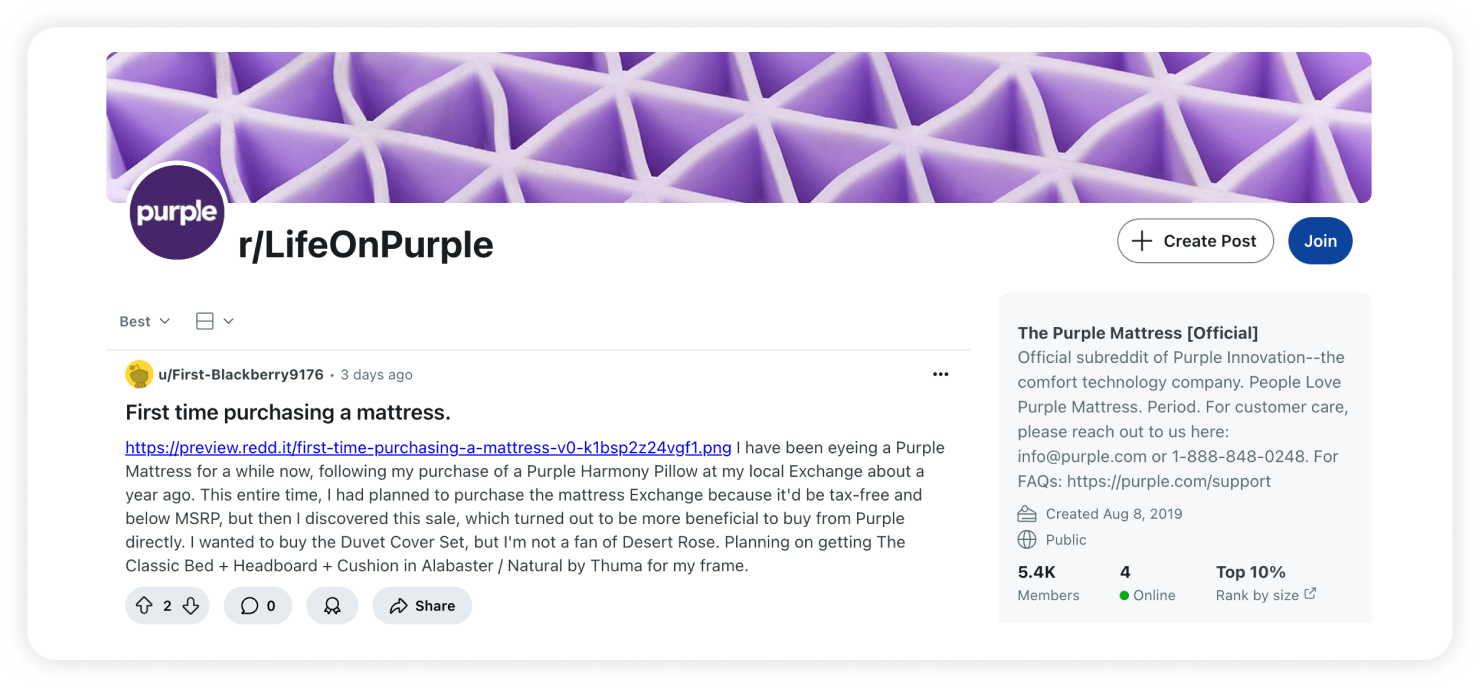
Purple Innovation uses their subreddit to quickly respond to customers or potential customers. In addition to creating a transparent experience, it also allows them to reinforce their brand narrative and signals across AI search, given Reddit’s high citation rate.
Lead or be defined by AI search
AI search is rapidly becoming a primary channel for brand discovery and research. The data shows that AI search visitors are remarkably valuable because LLMs equip them with more information upfront.
The risks are clear: If your brand’s not being mentioned or clearly cited, you risk rapid invisibility and losing market share to competitors. Plus, when AI has to pull information from third-party sources, it can lead to inaccurate portrayals and potential brand mistrust if outdated or inaccurate. Tracking and optimizing these sources is vital.
The future of search is AI-driven. Brands that adapt now will take the lead in visibility. Will you proactively shape your brand’s AI narrative, or will you be defined by it?
Choose to lead this new era and be the brand that AI search recommends with Semrush AI Optimization.
Opinions expressed in this article are those of the sponsor. MarTech neither confirms nor disputes any of the conclusions presented above.
Related stories
New on MarTech
